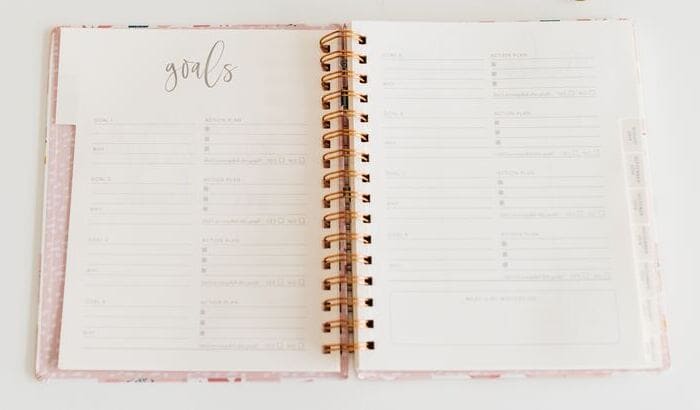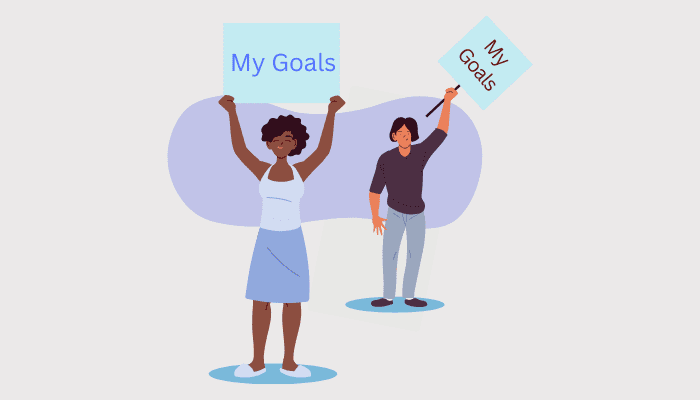If you are in sales, setting personal goals is really your secret weapon to success. In this post (and video), I’m going to walk you through the key steps to ensure that you can set and achieve your personal goals.
If you are in sales, chances are your manager, your boss, your business owner, or whoever it is, has set some sales targets for you. They might call them goals, but really they’re sales targets that they want you to achieve.
This can be anything from opening new accounts, opening a new territory, or even revenue targets that they want you to hit.
But what I’ve found is that top-performing sales professionals set their own personal goals.
Now when it comes to sales, personal goals are really your compass. They guide you as to the direction you want to move, both in your role, but also in your future career. So it’s important that you set personal sales goals.
I’ve been coaching sales professionals for over a decade. So what I’ve done is consolidated five steps that you can use to set your own personal sales goals and ensure your ongoing success.
5 Strategies for Setting Personal Goals in Sales
1. Set Your BHAG (Big Hairy Audacious Goal)
Step number one, you need to have some sort of big hairy goal, or I think BHAG is what it’s often called. Big hairy audacious goal. (I’m not a fan of things that are hairy, so maybe it’s just a big goal.)
Regardless of what you call it, you need to have an overarching goal for your year. Some sales professionals call them their mission statement. Others just call it their overall goal.
- This might be a revenue goal for yourself.
- It might be time away from the business.
- It might be starting a side hustle.
- It might be connecting with a number of new customers.
It really doesn’t matter what it is, but it’s something that’s personal to you.

So first step, I want you to think about the next 12 months ahead of you and ask yourself this question:
If there was one big thing that I could achieve, and maybe it’s a little bit out of my comfort zone, but I believe it’s possible, what would that goal be?
That’s step number one because that’s what’s going to guide us to all of the little actions and activities that follow behind that in order to try and achieve it.
2. Setting Smaller Personal Goals to Help Achieve Your BHAG
Okay, the second step to setting personal goals once you’ve set this big audacious goal, is to reach for something that seems a little bit of a stretch. Now we want to set some smaller goals that we believe will help get us there. So let me give you an example:
Let’s say for a moment that your big goal is to become the VP of sales in your company, and maybe you’re just a sales professional right now. So you set this goal, a little bit of a stretch, but hey, it’s a goal, it’s where you want to go.Now, what are some of the smaller goals that are needed to get you there?
So for example, you might realize, “Well,
- I have to demonstrate myself as a leader in the company.
- I need to hit certain revenue targets to stand out as somebody who really knows what they’re doing in sales.
- I need to introduce a new initiative.
- Maybe I need to open up a new territory.”
So to hit that big audacious goal that you’ve set for yourself, there are some smaller goals that feed into that.

You might even say, “I need some time off to be able to relax and kind of regroup around this goal.” That’s okay. Whatever they are, I would suggest you set three to five of these smaller goals.
As you achieve these smaller goals, which are likely achievable, let’s be honest, we want to make these reasonably achievable at this level. They’re stepping stones to get you to the big goal.
But the key is this: By setting these smaller goals, if you don’t hit that big goal, but you do hit several of the smaller goals, you’re going to feel good about yourself. That’s why these are important.
The smaller goals are stepping stones to your bigger goal. But they’re also wins and successes in and of themselves, which is going to make you feel better, which is going to keep you motivated to keep moving forward on your goals.
3. Manually Write Down Your Goals (with an End Date)

This next step here is pretty straightforward, but I think it’s critical to your success. Make sure you write down your goals.
Write out your big audacious goal, and also write out your smaller goals, those little wins you’re going to have along the way. When you write them down, write them as if they’ve already been achieved.
So let’s use the example of the promotion to the vice president as our big audacious goal.
Now you might say, “Why would I write it as if it’s happened when it hasn’t happened yet?” Well, I’m not a psychologist, but all the studies I’ve followed and read about and practiced on my own coaching clients and had them apply is that when we write things as if they’ve already been achieved, it kind of plays a game with our subconscious, which makes us start to think, “Oh wow, we’re already there.”
We know we’re not there. But it shifts our mindset from, “I can’t achieve this,” to, “Well, it’s almost as if it’s already been achieved. What do we need to do to get there?”
A little bit of a shift in language and in our own thinking, but it’s key that you write them down, number one, and write them down as if they’ve already been achieved.
The third piece of writing these down and being successful is to make sure you have an end date in there. Pick a date, whatever it is, and that is your date. So my example, I said by December 31st of whatever year, I want to achieve that goal.
4. Make Sure Your Personal Goals Scare You (a Little Bit)
The fourth strategy I want you to apply might seem a little bit odd, but it’s something to consider. Make sure that your goals scare you just a little bit.

Now I learned early on in personal goal setting, I was setting a lot of big audacious goals, ones that were pretty far-fetched. And what happened, I didn’t set the smaller goals, and when I didn’t hit them, I got bummed out, and then I blew up the entire process.
That’s when I realized we need smaller wins along the way because they also demonstrate success and they keep us motivated.
But those smaller goals still have to scare us a little bit, meaning they’ve got to be a little bit of a stretch. Sometimes this is called a stretch goal.
So for example, if one of my smaller goals on the way to my big audacious goal is to maybe open up 10 new accounts this year, and let’s say previously in other years your best year, you’ve opened up eight accounts.
Ten, it’s realistically achievable. It’s a stretch.
It’s going to require some work, but it’s possible. Now if you said, I’m going to open up 52 new accounts and you’ve never opened up more than eight, that’s probably not going to happen.
(If it does, congratulations. Maybe you should come on camera with me, we can talk about it!)
But ultimately, make your goals a little bit of a stretch. They have to be a little bit of a, “Oh goodness, how am I going to achieve this?” Because that generates energy, which generates some enthusiasm, which is how we get some momentum going around our goals, and it’s what keeps us moving along.
So make sure these smaller goals, they scare you just a little bit.
5. Share Your Personal Goals with Everybody
This last step here is the key to success with any goal: Tell everybody you know.

When I quit my full-time job back in 2010, no, 2009 actually, what I tended to do is I started telling everybody what I was going to do. Now, that was kind of a big goal. I’m going to quit my job and start doing sales coaching and training. (People thought I was out of my mind.)
But the key is I told people, not necessarily my big audacious goal, which I’m still working towards, but more about the idea I was going to leave my job and start my own business. That was a little bit scary, a little bit of a stretch, but I knew I could do it based on previous experiences I’d had.
But I started telling everybody.
Here’s why when we tell other people about our goals, it creates accountability. Nobody wants to go to 30 different people who come up and say, “Hey, did you do that thing?” And you’re like, “Oh, no, I didn’t do that thing.” That’s embarrassing.
So by telling other people, by communicating it, we actually create some accountability.
Start Setting Personal Goals Today!
If you want to be a top-performing sales professional, one thing will set you apart more than anything else, that is being clear on your targets and your goals, both weekly and monthly, and even annually. For that reason, I created what I call the 30-Day Sales Action Planner.
It’s a free PDF you can download by just clicking the link. You can print it off and use it in handwritten form, which is my preference, or you can simply fill out the form. But it’s a way to keep you on track and moving towards your sales goals.
The planner is no cost at all to you, but I think you’re going to find it’s going to keep you on track with achieving your goals.
If you want to become a top-performing sales professional, there are several skills you need to master. Make sure you watch more of my videos, which will help you master those skills and continue to move toward that achievable goal of becoming a top sales pro in your area.
© Shawn Casemore 2023. All Rights Reserved.

Share This Article
Choose Your Platform: Facebook Twitter Google Plus Linkedin